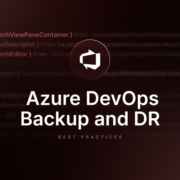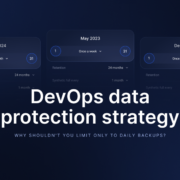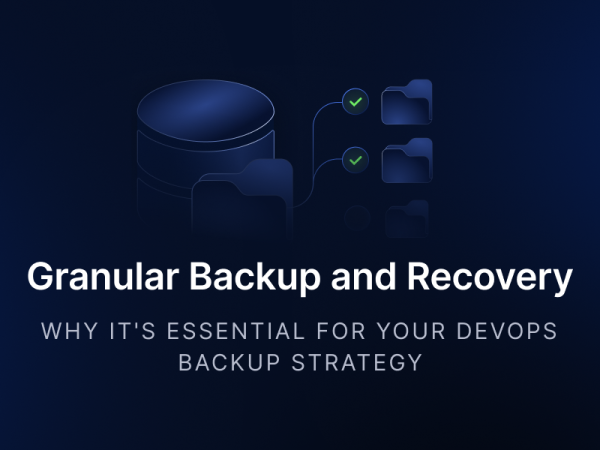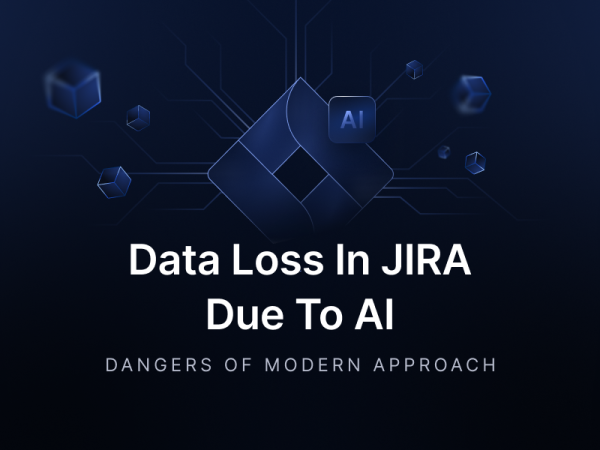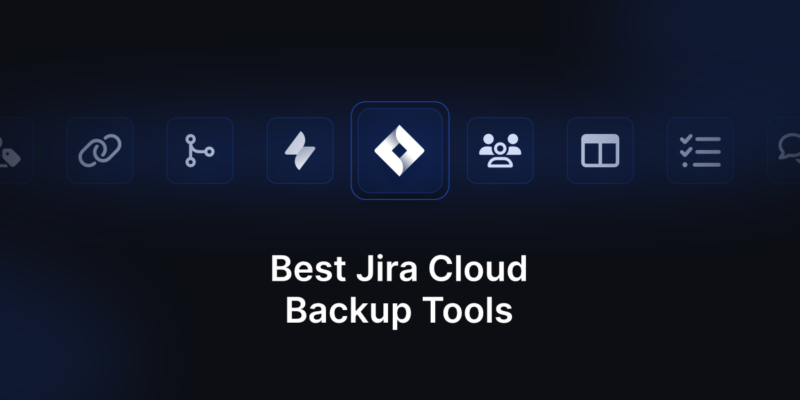
Exploring the Best Jira Cloud Server Backup Tools for Ensuring Data Protection and Recovery
Jira is a project management and issue-tracking solution that helps teams work together on projects. Created by Atlassian, it offers various tools to help companies organize tasks, communicate effectively, and track project progress. Jira is suitable for software development, IT services, business tasks, and customer support. Its flexibility makes it adaptable to different types of work.

In the dynamic landscape of project management and issue tracking, Jira Software by Atlassian stands as a cornerstone, facilitating seamless collaboration, efficient planning, and precise project tracking. As organizations embrace the power of Jira Cloud and its versatile functionalities, the need for comprehensive data protection and recovery strategies becomes increasingly evident.
Atlassian Cloud Terms of Service documentation strictly points out that Atlassian is “(…) not responsible for any of your data lost, altered, intercepted or stored across such networks. We cannot guarantee that our security procedures will be error-free, that transmissions of your data will always be secure […].” Hence, like many other SaaS providers, Atlassian recommends having a backup and disaster recovery in place for all its customers.
How can you secure your Jira cloud instance? Should you automate backups or rather focus on data coverage? How vital role plays backup speed and performance? Do you need any automation rules? How to plan ahead in case of hardware failure, accidental deletion and other more severe Jira issues.
The Significance of Jira Cloud Backup: Safeguarding Critical Data
At the heart of every successful project lies the repository of data within Jira Cloud. This encompasses an array of elements, including project history, issues, attachments, and interactions. Losing this data could potentially lead to chaos, errors, and delays, underscoring the significance of regular backups. These backups act as a resilient safety net, ensuring that data remains protected against unforeseen incidents and facilitating seamless recovery when the need arises. By integrating the best Jira Cloud backup tools, organizations can establish a robust data protection strategy that aligns with their unique requirements.
Granular Restore Capabilities: A Crucial Aspect of Jira Backup process
While backups are essential, the ability to restore data swiftly and precisely is equally critical. Granular restore capabilities offered by the best Jira Cloud backup tools empower organizations to restore specific data elements rather than the entire backup. This granularity minimizes data loss and expedites the recovery process, enabling teams to bounce back from setbacks with minimal disruption. With a few clicks, critical issues, projects, and data components can be restored, keeping project timelines on track.
Disaster Recovery and Business Continuity in Jira Service Management (JSM)
In the realm of IT service management, Jira SM plays a pivotal role. As organizations rely on JSM to deliver exceptional customer support and service, disaster recovery strategies become indispensable. Backing up your Jira SM data ensures that in the event of an unexpected disruption, your service operations can be swiftly restored. By implementing a robust backup solution, you guarantee the continuity of critical customer-facing processes.
Jira Backup Manager: A Technical Overview
The Backup Manager, a native Jira application, addresses fundamental data protection requirements within the Jira environment. It facilitates snapshots of Jira instances, ensuring the security of certain Jira data even during unforeseen circumstances. This tool performs manual exports of pages and users every 24 or 48 hours, including attachments. However, customers should be prepared to invest in their own infrastructure and storage resources for snapshot purposes.

Main Features and Functions
Cloud Backup: Jira Backup Manager covers backup files for Jira Cloud, encompassing data from all projects on your Atlassian account, whether they’re company-managed or team-managed.
Server Backup: Importing a cloud backup into a Jira Server or Jira Data Center product could lead to complications. Instead, opt for creating a backup specifically for the server.
Enhanced Security: Data is secured with AES 256 encryption during transit and while at rest, adhering to rigorous security standards.
Main Limitations
Selective backed up data coverage: Backup Manager safeguards only pages, users (with user group settings), and optionally, issue attachments, user avatars, and project logos. This potentially leaves out other critical data, exposing it to risk.
Manual Export and Scripting Requirement: The tool mandates manual imports (and download) and exports every 24 or 48 hours (including attachments). The absence of built-in automation means that you must create backup manually. The function of automated backups is not available. This demands continuous engineering efforts for script development, maintenance, and management, resulting in elevated long-term expenses.
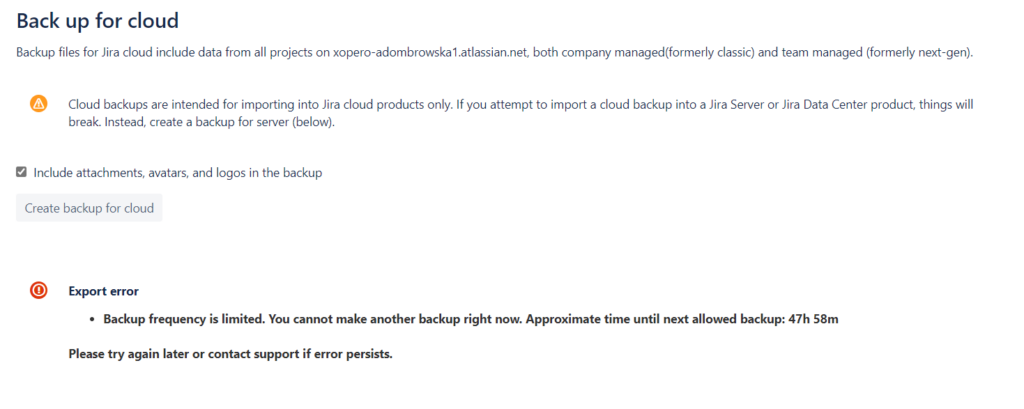
Additional Infrastructure Cost: Jira Backup Manager doesn’t offer any storage for snapshots. Customers must arrange their own storage resources to maintain and version snapshots, resulting in supplementary costs that accumulate over time.
Absence of Cloud Storage: Users are responsible for storing backup snapshots in their own environment, lacking the convenience and potential cost-effectiveness of cloud storage solutions.
48-Hour Attachment Export Limitation: Backups with attachments can only be exported every 48 hours, restricting the frequency and responsiveness of data protection measures.
Account-Level Restoration Exclusivity: Restorations are limited to the account (site) level, lacking support for item-level restoration. This introduces the potential for data loss during recovery.
Complex, Manual Restoration: The restoration process involves intricate manual steps such as unzipping, organizing, and executing restoration through imports. This complexity increases the likelihood of errors.
Account-Level Imports: Backup Manager treats restores as imports, with account-level restoration being the only option available. Granular restoration at the single item-level isn’t supported, presenting a binary choice between all or nothing.
The Role of Third-Party Apps in Jira Cloud Backup process
However Jira has its own backup manager, the Atlassian team recommends to seek for better solutions to backup your data. A lot of different products are available on the Atlassian Marketplace and today we will review 5 that offer the best set of features for protecting Jira organizations. While some of these apps enhance functionality, they also introduce additional layers of complexity to data management. That is while choosing the one for your company consider the ecosystem coverage, the types of data it protects, recovery scenarios, and management capabilities.
Why using a third-party Jira backup solution is a preferable autocome? Some of the reasons are:
- You can have more control over the backup frequency, retention period, and storage location.
- You can avoid data loss or corruption due to human errors, system failures, or ransomware attacks.
- You can restore your data faster and more easily with one-click recovery.
- You can meet compliance and audit requirements with backup reports.
Exploring Jira Backup Applications: A Comprehensive Review
The review of applications designed for creating backups in Jira highlights the critical role these tools play in ensuring data integrity and disaster recovery within the Jira ecosystem. These applications offer a diverse range of features, from automated scheduled backups to on-demand snapshots of project data, thus mitigating the risks associated with data loss or system failures. Furthermore, they often provide flexibility in choosing backup storage locations, including cloud services and local servers.
The review provides valuable insights into the efficiency, reliability, and convenience of these backup solutions, empowering Jira organizations to make informed choices for preserving their project data.
GitProtect.io
GitProtect.io is a cloud-based automated Jira backup software that offers the most advanced and comprehensive features (built in backup feature, scheduled backup, encrypted automatic backup, backup and restore process, and so on) Furthermore, it is the only solution that protects the entire Jira instance: Jira Cloud and Jira Service Management, with the additional option to backup Bitbucket data too.
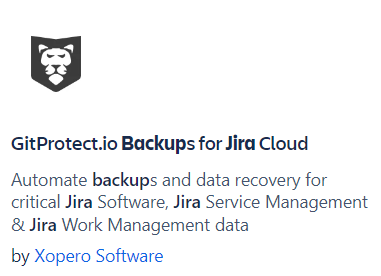
What distinguishes GitProtect.io from other Jira backup solutions?
Easy setup and management: You can backup your Jira data in minutes with GitProtect.io, without installing any software or agents. You can access and manage your backups from any browser, using a user-friendly interface that provides powerful dashboards, visual statistics, and real-time monitoring and on-demand actions.
Full data coverage: You can back up and protect all your critical Jira instance data, including Jira Assets, Jira Automation Rules, projects, Jira issues, attachments, roles, workflow, boards, etc. Moreover, GitProtect.io supports Jira Assets backup and recovery. Thus, with the software you can easily back up schema, roles, object types, icons, objects, statuses, reference types, etc.
Automatic and flexible backups: You can schedule your backups to run automatically at any frequency and time you want, or trigger them manually. If you prefer to test the application capabilities right away, GitProtect.io offers you a predefined backup plan with the best security measures in place. The solution is a great example of a Plug&Play approach – in this particular case, a user only needs to confirm the operation and that’s it. You can also create your own fully customized backup plan… or plans. With GitProtect.io you are able to set multiple backup policies. You will use this feature often if your organization has multiple offices, scattered teams, and operates in different time zones. Each backup plan can also have different retention settings (up to unlimited), encryption levels (user can set its own key), etc.
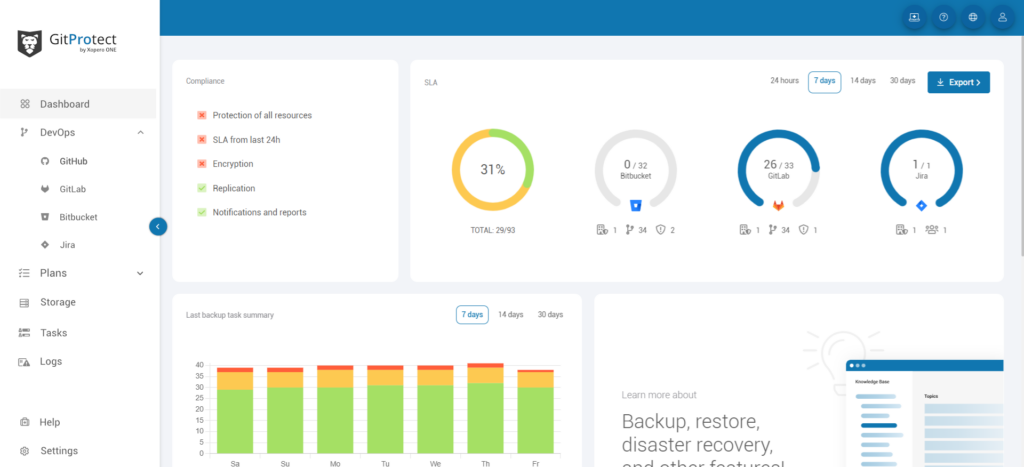
Multi-storage support: GitProtect.io is a multi-storage system with unlimited free cloud storage included. However, you can store your data in other public clouds (AWS, Azure Blob Storage, Google Cloud Storage, Wasabi, Backblaze B2, and any other one compatible with S3), locally (SMB network shares, local disk resources, NAS devices), or on the hybrid or multi-cloud environment. This is also a great option to easily meet the 3-2-1 backup rule requirement.
Data security and compliance: First, the backup coverage. You can back up all your critical Jira data: Projects, Users, Issues, Roles, Workflows, Comments, Attachments, Boards, Versions, Custom Fields, Votes, Audit logs, Notifications, and more. Second, AES-256 encryption. You can set a private encryption key to secure your data – this means that the key is not autogenerated but defined by the user itself. For an extra security measure, you can also use as a backup destination immutable storage. This one is a great option to secure sensitive or critical data and protect your organization against ransomware. GitProtect.io comes also with advanced monitoring, alerting, and reporting features. The solution can be used to help you comply with various regulations and compliances, such as GDPR, HIPAA, PCI DSS, ISO27k, SOC2, etc.

Fast and reliable recovery: as opposed to Atlassian native backup capabilities for Jira, GitProtect.io ensures you with granular, point-in-time restore, and disaster recovery. In the first case, you can browse data and restore only selected resources, the ones you especially need. The second option allows you to instantly restore entire Jira account data and is your easy way out from devastating outages (like Atlassian’s 2022 Jira outage). You can also select your restore destination which can be a new or the same Jira Cloud account, or a device.
A great option if you need to migrate data: you can use GitProtect.io to migrate Jira data and the entire configuration from one project to another, or move between various Jira accounts – even to the free one with a no-user recovery option.
- Jira Cloud <-> Jira Cloud,
- Jira Service Management <-> JSM
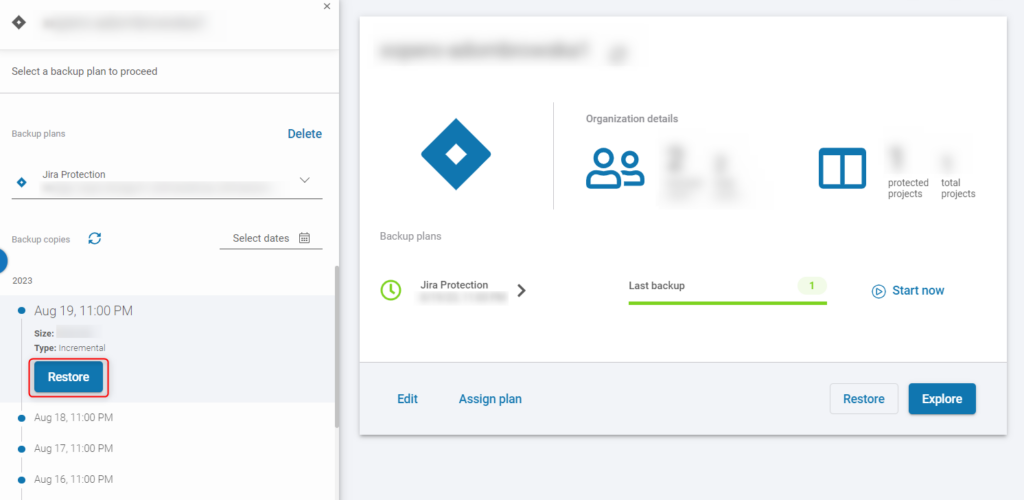
Cost: there is a free 14-day trial available, which is a great way to test the key backup, recovery, and reporting features. If you choose to install GitProtect.io from the Atlassian Marketplace you can get it free up to 10 users. The pricing starts from 1 user up to… unlimited. As in many similar cases, the billing heavily depends on the number of acconts you want to protect. For example, if your goal is to back up more than 250 Jira accounts you will get a $ 2.63 per user price – you can also choose between a monthly or annual payment.
Revyz Data Manager for Jira
This tool for Jira is a cloud-based app that helps Jira admins manage, protect, analyze, and optimize their Jira data.
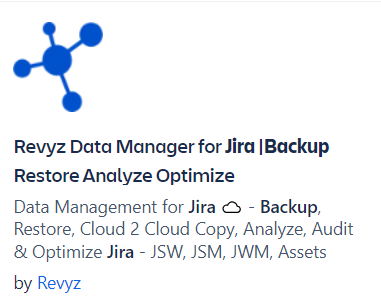
Advantages
Backed up data and restore process: You can secure your Jira cloud data with backups that run automatically or on-demand.
Clone and migrate: You can quickly and easily copy or move your Jira configuration and data from Sandbox to production or any other site. You can also filter what you want to clone or migrate, such as projects, issues, workflows, schemes, etc.
Analyze and monitor: You can get a comprehensive overview of your Jira configuration and data with visual dashboards and reports.
Clean up and optimize: You can remove unwanted system objects, such as inactive users, duplicate issues, empty projects, etc.
Disadvantages
No Disaster Recovery: Revyz enables granular restore of Jira objects, including Issues, Attachments, Configuration, Asser Config, Objects, etc., yet it doesn’t support recovery of the entire Jira instance at once.
Cost: It is a paid app that charges based on the number of users in your Jira site. The pricing starts from $32/month for up to 10 slots and goes up to $2400/month for 1000+ users.
Rewind Backup for Jira Cloud
Rewind Backup for Jira Cloud is a cloud-based app that helps protect Jira Software and Jira SM data with automated daily backups and simple data recovery.
Here are some of the pros and cons of using Rewind Backup for Jira Cloud:
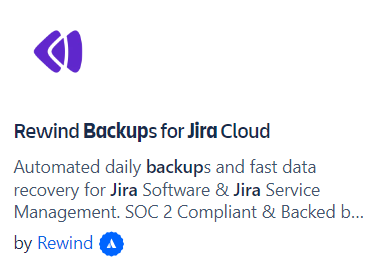
Advantages
Easy setup and management: You can install Rewind Backup for Jira Cloud from the Atlassian Marketplace and connect it to your Jira account in minutes.
Automatic backups: You can secure your Jira data with automated daily backups that run automatically in the background, without affecting your Jira performance.
Fast recovery: You can restore your Jira data with Rewind Backup for Jira Cloud, using the point-in-time granular recovery option.
Unlimited storage: You can store your backups in Rewind’s cloud storage, which is unlimited and encrypted with AES-256 encryption.
Disadvantages
Cost: Rewind Backup for Jira Cloud is a paid app that charges based on the number of users in your Jira site. On the Atlassian Marketplace the backup solution is free for up to 10 users. If you have a more complex architecture, you will need to pay from $44/month for 11 users and the price goes up to $1900/month for 1000+ users.
Limited scope: Rewind Backup for Jira Cloud only supports Jira Software and Jira Service Management data. It does not support other Atlassian products, such as Confluence or Bitbucket – for that, you will need independent apps. It also does not support cloning or migrating. Backed up data flow covers only Jira Stack.
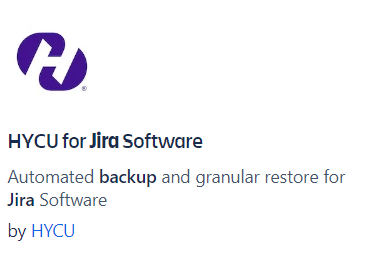
HYCU for Jira Software
HYCU for Jira Software is a cloud-based app that helps protect Jira data with automated backup and granular restore.
Advantages
Automatic backups: You can secure your Jira data with automated daily backups that run automatically in the background, without affecting your Jira performance.
Fast recovery: You can restore your Jira data backup with HYCU for Jira Software, using the point-in-time granular recovery.
Unlimited storage: You can store your backups in HYCU’s cloud storage.
Disadvantages
Potential data loss: HYCU for Jira Software relies on the availability and reliability of the HYCU Protégé Marketplace and the HYCU cloud storage. If there is any downtime or disruption in these services, you may not be able to access or restore your backups when you need them. You may also lose your backups if HYCU suffers from a security breach or a data deletion.
Cost: HYCU for Jira Software is a paid app that charges based on the number of users in your Jira organization (not a backed up data size). To get a quote you will need to reach out HYCU sales team.
Skyvia Backup for Jira
It is another of the options available in the market, a cloud-based application that offers daily automatic and manual backup for Jira data.
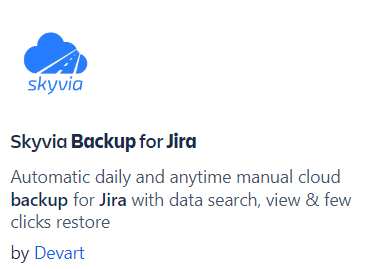
Advantages
This is a cloud-based application that provides an automatic and manual daily backup for Jira data. It allows users to restore all of their projects, issues, and other data or separate records only.
The price is reasonable and adequate to offered basic features.
Disadvantages
It does not support incremental backups, which means it backs up all the data every time, consuming more storage space and bandwidth. What is more, this solution does not allow users to schedule backups at their preferred time, only daily or on-demand.
The other disadvantage is that this application does not offer encryption or compression for the backed up data, which may pose security and performance risks.
Summary
Which Jira backup solution is going to be right for your organization? The answer heavily depends on the issue you need to resolve, internal security policy requirements, backed up data needs, the size of your organization, the available budget, and so on. If there is only one thing to advise – take advantage of the available trial period and test products mentioned in this article to the full extent. Cover as many scenarios as possible – backup, restore, DR options, ransomware protection, check also reporting & alerting capabilities (you want at least two independent channels, mail&Slack, etc.). Look for the RBAC (role-based access control), SAML-integration, or built-in security measures like password vault. Check everything to be sure that your perfect Jira backup solution has you back(up) at any given time.



